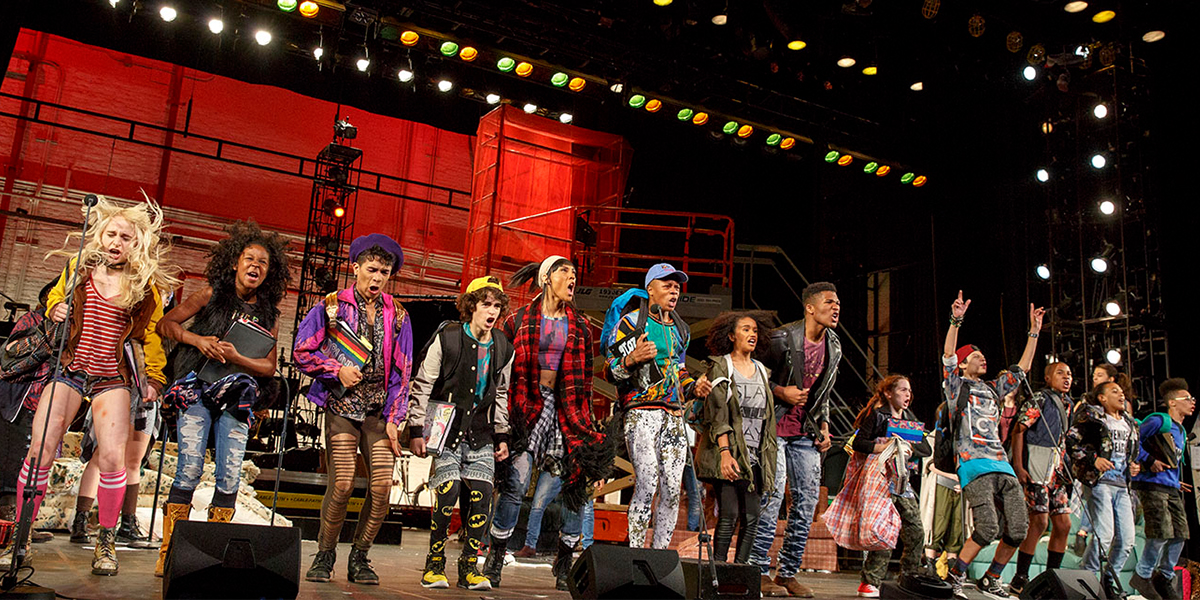
Before Rent; Spring Awakening; Hamilton; or Bring in ’da Noise, Bring In ’da Funk, there was Runaways. The writer/director Elizabeth Swados, driven by her love for musicals and giving a voice to those who lack one, was a passionate advocate for true contemporary musical theatre. Theatre, she once noted, should reflect “how and what we are now.” The embodiment of this artistic and activist spirit is urgently captured in Runaways, a transformative and unique musical based on true-life interviews with young people living on the street. This revolutionary work originated at the Public Theater’s Cabaret, and eventually found itself leaving an indelible mark on Broadway.
In celebration of the musical’s 40th anniversary, we sat down with composer, arranger, pianist, conductor, and producer Jeanine Tesori (Fun Home; Violet; Caroline, or Change) and choreographer and director Sam Pinkleton (Runaways; Natasha, Pierre and the Great Comet of 1812; Significant Other) to discuss the memories and lessons of working with Liz and the enduring legacy of Runaways.
Lawrence Haynes: I would love to know what your first experience with Liz was like. When and how did you meet her? What struck you about her?
Sam Pinkleton: We have very different answers to this, I think. I met Liz as a 19-year-old musical theatre student at [New York University (NYU)]. My biggest dream in the world was to be a chorus boy, upstage right, in a summer stock production of 42nd Street. And Liz, who I knew nothing about, taught an elective class that was called “Adaptation” — whatever that means — which I took because it worked with my schedule.
I walked in and learned that it was a class where this lady with crazy hair, a giant jean jacket, and keys coming out of her pocket forced people to write, direct, and perform their own work, something I had never considered. On the first day of class, she said, “You’re not a f***ing chorus boy. You’re an artist. Make some god-damned work. Shut your mouth! You’re not dropping this class!” It scared the hell out of me, and it absolutely altered the course of my life. I never looked back. It was amazing and challenging. A creative breeding ground where Liz took no s**t and forced all of these bright-eyed NYU students to really interrogate the world around them, as well as value themselves as more than just musical theatre robots. I truly would not be doing anything that I’m doing now had I not had that chance encounter.
Jeanine Tesori: I was introduced to Liz’s work a while before I met her. I was 19 and a pre-med student at Barnard. I went and taught at Stagedoor Manor where they were performing and studying Runaways. It’s interesting to hear Sam’s story because I knew nothing about theatre. I did not want to go into theatre, I did not understand anything about theatre, or why anybody did it. At that point, I’d maybe seen two musicals in my life. But, I walked into Stagedoor Manor and that kind of work, and I thought, this is what I should be doing. I went back, switched my major to music at Columbia, told my parents, and dealt with the fallout!
I then met Liz many years later when she was doing Books Cook! at Scholastic. By then, I was so aware of her work, and by the time I had started the Encores! Off-Center program, I was obsessed. Runaways was one of the top ten shows I wanted to do. I celebrate everything about it — the way it was made, and the rigor and the heart with which she made it. For my final season at Encores! Off-Center I said to Liz that I wanted to present Runaways, but I wanted one of her ex-students to direct it, and that’s how Sam and I met. Liz connected a lot of us through her teaching, her heart, and her work.
That’s actually a great segue to my next question. Runaways was made as a generative work. Do you think the process through which she created it was emblematic of her writing style, her creative spirit?
Sam: Absolutely, I think it was in two major ways. Number one, I think that Liz had no real interest in making what she thought people wanted. She had an interest in making what she thought people needed, and gave voice to conversations that were not being had, not only in theatre but out in the world. She put ideas in front of people that they didn’t necessarily want to think about, but should. It was a thematic quest that she was on her whole life, and she was often quite unpopular because of it.
Number two, the way the show was made. The mythology of it is that a 26-year-old Liz marched into Joe Papp’s office with this big idea, and she got a room at The Public for a year. She went out on the street, she talked to people, she brought it back to the theater, and she sculpted it. But, in my experience making shows with her, I think Runaways was very unique. It’s about the thing, in its entirety, rather than its form.
Jeanine: Liz lives on, not just through her work, but through her methodology for making the work. It’s one thing for us to do Runaways, but it’s another for people to understand how to make their own work. Runaways produces generations of generative artists who don’t obey other people’s work, but create work they’d want to see. I know so many wonderful people whose work is creating a difference, but I know very few who make sure that they also take their machetes out and widen the path for other people to walk through the jungle.
Sam: Yes, and to Jeanine’s point, I don’t think that Liz — and I don’t want to put words in her mouth, because she’s not here to tell us — ever thought that a single one of her shows was finished. I think that she believed in moving a conversation forward in a way that adapted to the world, current events, and the temperature in the room.
There are stories from the original Runaways production on Broadway where they would design new things, put new words in, or switch songs. When we were making a show with Liz and there was a horrible thing in the headlines, the next day there would be a new song about that thing.
Expanding on Liz’s responsiveness to the news cycle while on Broadway, how do you think Runaways continues to be relevant today?
Jeanine: It brings the world into the theatre. I think that sometimes musical theatre can get so formal and trite, I know because I’ve written some of those things! But, to me, theatre is the world, it’s a reflection of behavior, of psychology. With Runaways, Liz went out to Union Square, got real people and said, “This belongs to you.” She said, “If we’re going to call this theater ‘The Public Theater,’ I’m going to get the public into the theater, and get them on the stage.”
Today, we see the struggles of transgender and non-binary youth. They don’t run away per se, but their parents are running from them. That’s a real twist on what I thought a runaway was. For me, growing up, it was a counter-culture thing of “I don’t accept your generation, so I’m leaving.” Now I see a generation of young people who aren’t allowed to stay home because they don’t carry the “values” of their community or their parents. Like a blooming onion, the show just keeps unveiling these riches.
Sam: I’m really glad you said that. Liz wrote a show called Runaways. She didn’t write a show called “homeless kids.” It is a much broader idea than that. Runaways asks, what are we running from? What are we afraid to talk about? What would happen if we removed the adult perspective and listened to young people who didn’t always agree with each other nor always agree with us? What if rather than making it some kind of community project and putting it in the church basement, you put it on our grandest stages?
And what if you put it in front of an audience who isn’t necessarily used to encountering conversations that way? And what would happen if, rather than saying, “Watch something you can easily digest and get to your parking on time,” we said you’re actually going to meet us where we are? For these 90 minutes, I’m asking you to consider what would happen if you were only this nice to young people and all of their complications, and what you learn from that, and how the world might look a little bit different if we took that moment to listen.
Because we are in a moment where activism, as we know it, is being pulled forward by 17-year-olds. It is remarkable, and I don’t think that we would be thinking about gun violence in the same way were it not for these amazing teenagers. For me, it is incredible to look up and see kids onstage who look like our city, not just a musical theatre version, and it should look like whichever city [in which] Runaways is performed. The show is the unspoken stories of teenagers from any community.
I’d like to finish this with talking about Liz in more personal terms. What did she leave you with?
Jeanine: We had the premiere last night of Soft Power [A new musical from David Henry Hwang and Jeanine]. I was sitting next to someone, and they said, “You seem nervous.” I responded, “What are you talking about? I’m a wreck.” He said, “You’re so cool on the surface, but it just occurred to me that you’re just as vulnerable as anyone.” I realized that I tend to package myself to look a certain way, but I’m a lot. Liz was a lot, too. I think of her often, with her crazy hair and her jackets — it’s very Liz. It’s like she’s saying, “I take up space, I have ideas, I’m here.” I learned that you don’t have to shrink-wrap yourself down for someone.
Sam: Liz left me with a lot of fire. She left me thinking that rage is useful. She blessed me by demanding to try harder, to not accept how theatre is “supposed to be.” She taught me that theatre is not about me, it’s about the world. It’s about amplifying people who don’t have access to the things I have. Liz would go deeper, try harder, and not shy away from uncomfortable things, or pat herself on the back for doing something a little political. She taught that we should dig in the same way that we would if we were full-time activists.
She taught me to ask what singing and dancing do that is effective for human transformation, for change, as opposed to having a lovely time seeing Brigadoon. She hated that s**t. But, she loved razzle dazzle. There’s a sad mythology that people attribute to Liz, that “she was the angry political person that hated theatre.” She wasn’t. She f***ing loved Broadway. She loved it, like she loved HAIR… that’s why she wrote a song mocking it. She was the idea that you can be both a citizen of the world and do it through singing and dancing. It is a dizzying challenge that is a life’s work. I think a lot of people who come from her “tree” feel that duty and a way to make a life in musical theatre. There’s a way to be bolder. There’s a way to have more teeth and more fire.
To learn more about Runaways, visit Concord Theatricals.

Newly Available for Licensing – January 2026 (UK)

Newly Available for Licensing – January 2026 (US)

